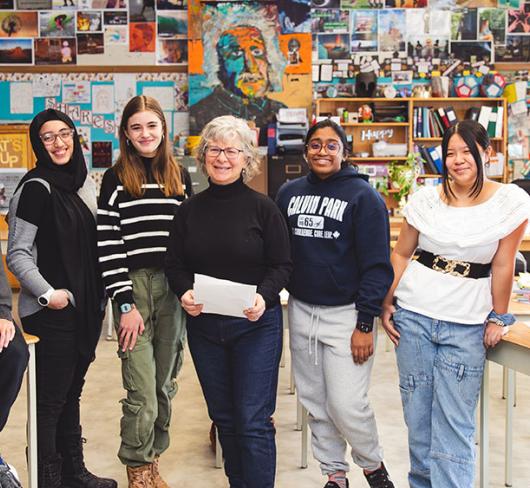Imagining Poverty: ETFO’s Professional Learning Projects: a Small school Dreams Big
Temagami Public School is nestled at the base of a steep embankment along Highway 11 and is sheltered between the Ontario Northland railway line, pine forests, and the village of Temagami. Summer visitors and residents alike are captivated by this beautiful place.
In the 1970s, Temagami was a thriving community with jobs aplenty in the forestry and mining industries. The community school was bursting at the seams with 350 students. However, in the late 1980s, when the mine closed and the forest industry declined, full-time employment became scarce and families moved away. For the past six years our school has had between 68 and 80 students including some who travel for up to an hour on the bus every day.
When we were chosen to participate in ETFO’s Poverty Project, we were excited but initially we grappled with some important questions.
At our first professional learning community meeting, we reflected on our own experiences and perceptions about poverty and began to think carefully about our students and their families and some of the financial and social barriers they face. We also thought about our building, location, and meagre school budget. We concluded that poverty (in the financial sense) and lack of opportunity were real issues for our school community. This led to further reflection: What could we do about it? How could we make our students’ lives richer?
Doing a lot with a little
Efforts by the creative and resourceful staff, students, parents, and community volunteers meant that our school had adapted and used what we had to provide a variety of opportunities for our students: a nourishing snack program, successful Christmas concerts, school-wide drama productions, and lunches and activities highlighting literacy and numeracy learning.
Our discussions turned to less tangible concerns like our students’ lack of experiences, which results from our distance from large centres (100 km to North Bay with a population of 50,000) and a limited school budget. We therefore decided to focus on providing students with as many new and enriching learning experiences as our resources would allow. As we developed our plan, we began to move toward a major focus on arts and culture, as well as on supporting athletics and active living. It was also imperative to share our good fortune with other small rural schools in the southern region of District School Board Ontario North East, as we all face similar restraints.
Enriching experiences
Danny, King of the Basement was a perfect opportunity to launch our project. We staged the play at New Liskeard Public School (about 60 km north), a central location to the board’s southern region, and we invited junior classes from six other schools to attend. In the afternoon, the cast and crew travelled back to Temagami to engage our students in drama workshops. What a great beginning!
Other cultural activities followed. We invited our neighbours from the Laura Mackenzie Learning Centre at the Temagami First Nation to join us for a performance of The LonelyLeprechaun, a marionette show with an environmental message. Our Primary students saw a community theatre group’s performance of Robert Munsch stories in North Bay. Our Intermediate students participated in a series of visual art workshops hosted by a local artist, giving them opportunities to paint in a variety of styles. Along with guests from other small schools, our grade 1 to 6 students participated enthusiastically in the performance of the professional children’s opera, Elijah’s Kite, at the Cobalt Classic Theatre. Our Intermediate students performed with great success at the Temiskaming Music Festival in New Liskeard, overcoming their inexperience and lack of self-confidence.
Enhanced winter sports
Our students were also able to participate in several large sporting events and activities because we had the funds to pay for the transportation to get there. With a cost of over $200 per trip to travel to tournaments in New Liskeard, this is something we cannot always afford. We were also able to provide students with an expanded winter program of curling, skiing, and snowshoeing. Surely we were making a difference!
However, many of our students are not necessarily aware that they lack for experiences or opportunity, having lived in the community all of their lives. They are able to fish, boat, and camp, and have adapted to a community that does not offer all of the services or opportunities of a larger centre. So, had we really made a difference?
Looking ahead
Our students greeted each new activity with enthusiasm but judging the long-term impact is difficult. As a staff, we are now more overtly conscious of poverty and more sensitive in our approach to issues like indoor shoes, hot lunches, and asking parents to contribute financially to support field trips. We hope that we have become more respectful and compassionate toward all families.
As at all schools, promoting positive character traits is a major focus at our school. This project has allowed us to actively model generosity, compassion, and inclusion by inviting others to share in our project. We have encouraged our students to show more compassion and understanding as they think about the effects of poverty and other social issues through class discussions, choice of literature (e.g., Fly Away Home, Lily and the Paper Man, For EveryChild a Better World) and fundraising events for charitable organizations. We encourage our students to look beyond stereotypes and biases and to appreciate diversity, and we are beginning to see the idea of poverty and lack of opportunity included in student writing and reading responses.
The hurdles we face are a small budget, isolated location, and lack of resources and opportunities. However, we are eagerly planning our final event of the year: in Proud to Be…we will celebrate who we are, where we are from, and what we do have, showing our pride in our great community and our school.

